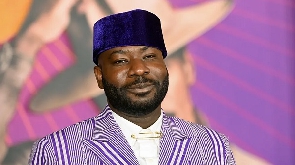Blitz Bazawule, the director of a new film adaptation of Alice Walker's revered 1982 novel The Color Purple, is a true renaissance man.
In his 41 years, the Ghanaian has also co-directed a Beyoncé film, published a novel, performed his music across the world and set a Netflix record.
His latest challenge - a musical of the potent, Pulitzer Prize-winning book about a troubled, young, black woman fighting racism and the patriarchy in America - is released in the US on Christmas Day.
Bazawule's Color Purple follows a 1985 film adaptation that won actress Whoopi Goldberg a Golden Globe, and a Broadway musical that opened in 2005.
Directing a second film version of a celebrated classic is a high-pressure task, but the Atlanta-based artist certainly has the credentials.
Born Samuel Bazawule in the Ghanaian capital, Accra, he had a deep penchant for drawing as a boy.
Music was also a major passion, particularly jazz, Ghanaian highlife, Motown and Afrobeat (a forerunner to the currently popular genre Afrobeats).
However it was hip-hop, specifically Public Enemy's 1988 album It Takes a Nation of Millions To Hold Us Back, that had the biggest impact on Bazawule.
"I had never heard young black people express themselves in that way before," Bazawule said on the website of his now defunct artist development company, Embassy MVMT.
Inspired by Public Enemy, Bazawule released several mixtapes after he left Accra to study at Kent State University in the US.
After graduation he moved to New York - the birthplace of hip-hop - to pursue a music career.
He has released four studio albums under the name Blitz the Ambassador and raps in English, Ghanaian language Twi and West African Pidgin.
Seun Kuti, Angelique Kidjo and Nneka are among the fellow African music stars to feature heavily in Bazawule's songs, while - in a full-circle moment - Public Enemy's Chuck D appears on his 2011 album Native Sun.
Several years later, Bazawule used some of the money he earned from performing to fund his critically acclaimed, debut feature film The Burial of Kojo.
"I realised no investor was interested in financing an African film that didn't revolve around the narrow clichés of war and disease. Self-funding was my only option," Bazawule wrote on crowdfunding site Kickstarter, as he attempted to raise more money for post-production.
Through magical realism, The Burial of Kojo tells the story of a young girl on a mission to look for her father after he goes missing while working in a gold mine in Ghana. The film was shot in the country with a local cast, who speak Twi throughout most of the film.
Bazawule composed and performed the score for The Burial of Kojo, telling the BBC after the film's 2018 premiere: "Making film is, I believe, the quintessential mix of all creative endeavours - you get to be a bit of a writer, you get to be a bit of a visual artist, you get to be a bit of a musician, all in one."
Despite not possessing formal training or funding from traditional sources, Bazawule's debut film caught the eye of Hollywood titan Ava DuVernay, director of projects like Selma and When They See Us.
After her company Array picked up The Burial of Kojo's distribution rights, it became the first Ghanaian-produced film to stream on Netflix.
Bazawule received widespread critical acclaim, with the New York Times praising "a near-virtuoso work, a feast of emotion, nuance and beauty, and a startling feature directing debut".
And film critics were not the only ones who were impressed. According to Bazawule, it was after watching The Burial of Kojo on Netflix that Beyoncé invited him on board her own cinematic effort, Black Is King.
Released in 2020, it serves as a visual companion to Beyoncé's soundtrack for the 2019 Lion King reboot.
The film celebrates black identity and female empowerment, while showcasing talent and culture from across Africa.
Bazawule went on to bag a Grammy nomination for his work on the project.
After entering the fields of film and music, Bazawule then crossed the frontier into literature.
His 2022 novel, The Scent of Burnt Flowers, follows a couple who seek asylum in Ghana after fleeing persecution in 1960s America.
It is reportedly being adapted into a six-episode TV series - with Bazawule writing, directing and producing.
For Bazawule, key to his take on Celie, the character at the centre of The Color Purple, is her fertile imagination - using that to show how she overcomes abuse and trauma.
"She's working in her head to liberate herself," he said in an interview in the run-up to the film's release.
The Color Purple is also said to have African musical influences thanks to Bazawule - and he remains inspired by stories from his birthplace despite not having lived there for decades.
He encourages other African creatives to bring their countries to the big screen, addressing filmmakers in his interview with the BBC.
"Look inward, look at what we have on the continent. Visually, it's unmatched. So know what you have, do the work and believe," he said.
General News of Sunday, 24 December 2023
Source: bbc.com

















